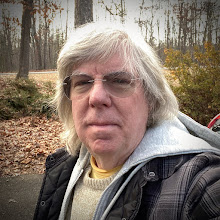“A book is made from a tree. It is an assemblage of flat, flexible parts (still called "leaves") imprinted with dark pigmented squiggles. One glance at it and you hear the voice of another person, perhaps someone dead for thousands of years. Across the millennia, the author is speaking, clearly and silently, inside your head, directly to you. Writing is perhaps the greatest of human inventions, binding together people, citizens of distant epochs, who never knew one another. Books break the shackles of time, proof that humans can work magic." — Carl Sagan
During a recent lunch break at work, I was leaning back in my chair with my feet up, reading a book. As I finished my sandwich a co-worker wandered by, and seeing the book in my hand, asked the question that reading in public so often evokes: "What ya' reading?"
In this case it was a book about prime numbers, the zeta function, and the Riemann hypothesis. I am fascinated by the primes… but I will save that subject for another time. I showed the cover of the book to my co-worker. “Cool” was the reply. Yes, very cool. That is the book I keep at work… for reading as I enjoy my PB&J on wheat.
In this case it was a book about prime numbers, the zeta function, and the Riemann hypothesis. I am fascinated by the primes… but I will save that subject for another time. I showed the cover of the book to my co-worker. “Cool” was the reply. Yes, very cool. That is the book I keep at work… for reading as I enjoy my PB&J on wheat.
I have no idea who said it: “You are what you read”. Are we truly? Is the old saying a valid hypothesis?
At home I am reading a book that concerns itself with the history of algebra… awesome… hard to put down… it is… really. I am also reading (on and off) a book about the mathematical language of symmetry (i.e. group theory). The former, thus far, is a much better read than the latter, but I am optimistic that the book on symmetry will become better as I get further into it.
I also like books by Brian Greene. There are three of his works in my personal library; two of which are on my nook and one remains unread (for now). I like to read from his books when I forget my place in our universe; when I need to be reminded that while God is incomprehensible and unknowable, God’s manifestations are not.
Not everything I read pertains to mathematics and science. My nook has on it a book written by Thomas Buergenthal, entitled “Lucky Child: A Memoir of Surviving Auschwitz as a Young Boy”. It is painful yet inspiring, eye-opening and humbling. In 1992 I visited Dachau, the concentration camp and the town. My memories of the town have faded. My memories of the camp have not. I spent the better part of a day walking within its unyielding walls and foreboding fences. Even though it has been nearly 20 years since I walked through its huge black-iron gate, the effects of being there still resonate within me.
I do read fiction, now and then, not often, just now and then. When I was reading Ken Follett’s “Pillars of the Earth” and “World Without End”, I could not put them down. After finishing the second book I was left wanting for a third.
And who amongst us has not let their imagination run free and made that special journey through the works of J.R.R. Tolkien and perhaps J.K. Rowling? I have made both journeys multiple times.
In closing, I cannot offer a mathematical proof for the hypothesis; at least not one that will stand up to rigorous scrutiny (or any scrutiny for that matter). But I do think it true. For I have told you who I am through the books that I read. I think we are, everyone of us, defined precisely by what we read.
“All of the books in the world contain no more information than is broadcast as video in a single large American city in a single year. Not all bits have equal value.” — Carl Sagan

